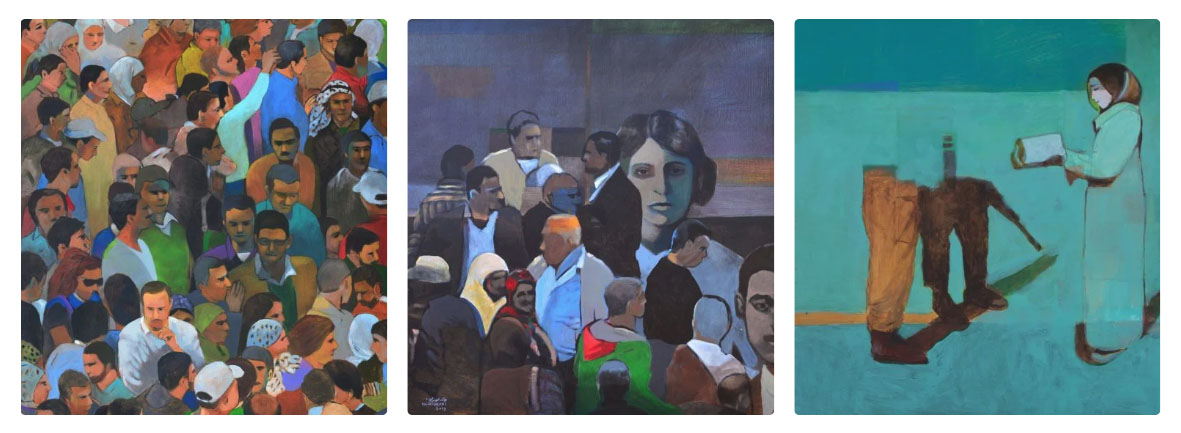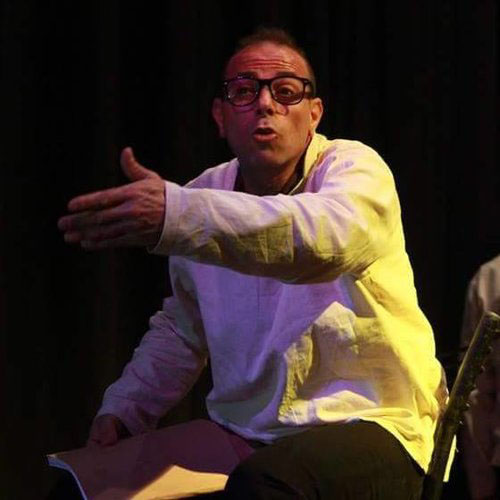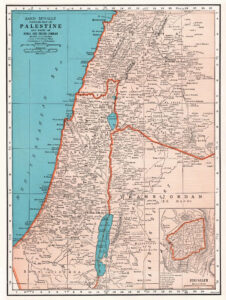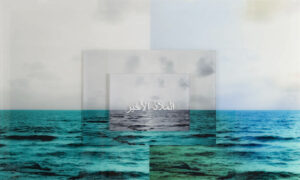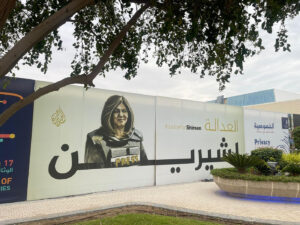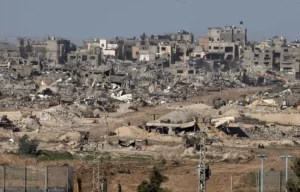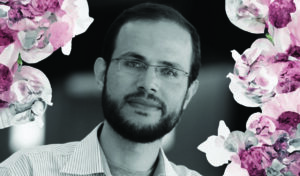Don’t believe the hype about the IDF lowering the intensity of the war when you have reliable eye-witness reports from inside Gaza’s war zone.
Hossam Madhoun
Day and Night
I wake at 6:30 am every day. My host is amazing. At 6 he is in the side yard of the house lighting the fire, preparing breakfast and hot tea. I am not allowed to leave without breakfast. He asks about my mother, repeatedly asking if she or I need anything.
Leaving at 8 a.m. for the office of my organization, Ma’an Development Agency, in Rafah. Full house, people from everywhere, from many associations that have no offices, trying to follow up on the interventions they are making for people.
Rafah, which used to have 170,000 inhabitants, is now hosting more than a million, at least half of them on the streets, building tents from plastic sheets that do not prevent cold or rain. But this is what is available. The market in the town center is over busy. It feels like a million people are gathered in this town center.
I’ve realized that there is plenty of work that we do besides providing psychosocial support; we distribute food; we build kitchens and distribute hot meals; we distribute hygiene and dignity kits to displaced people; we distribute water tanks to shelters and random collectives of displaced people; we distribute clothes for children; and we are trying to bring in better tents for people, we employ staff to clean the schools and mainly the toilets on a daily basis. All of this, as well as what the UNRWA do, as well as what all the humanitarian organizations offer, meets almost zero of people’s real needs. With the stoppage of normal life, no one has any kind of income in Gaza; all that 2.2 million people look for is shelter and food. But above all, people are in need of safety and dignity. It is not here anymore.
I got involved in all of this as a member of Ma’an emergency team. I have no chance to think about anything. It’s like a beehive. But I can’t stay at the office more than five hours; I must go back to my mother who gets panicked if she doesn’t find me around her at 2 p.m.
Back home, my mother must blame me for being late whether I am early or late. I provide her with what she needs, then try to rest.
Rest!!! I hate it. While trying to rest, thinking starts. What has happened to my brother and sister’s families? Are they alive? Did they survive? Maybe some died, and some survived. My wife Abeer and her family — no contact for the last three days. I will go to Nuseriat tomorrow to check on them. I wanted to go earlier but could not.
When will this nightmare end? Does it have an end? What kind of end? What will life look like when it ends, with completely destroyed cities and towns? Who is going to be the ruling authority? A new Israeli military occupation? The corrupt authority of Ramallah? Hamas again?
As much as I try to get busy with the family hosting me in order to avoid thinking, night is coming. Dark thoughts invading my head, falling asleep I don’t know how, and waking up in the morning so tired as if I did not sleep or rest at all
Horror and Relief
It is six days without any news about my brother and sister’s families, since my nephew told me that the building behind their house was bombed and collapsed on their home. No news about whether they were inside or had left before. I did not stop trying to reach them but communication between the south and north is cut.
Today more horrific news: in the morning, calling my daughter in Lebanon, which is much easier than calling my wife in the middle area, she told me that her mother, my wife, Abeer, is in a panic. She saw a video of an injured person taken to Al Aqsa Hospital who died before reaching the operating room and she believes it is her brother. She shared the video with me. There was no way to tell who this person was; his face was mostly covered; his body is similar to my wife’s brother, but wait!!
My wife’s brother is in Gaza City, even if he is injured, he won’t be brought to Al Aqsa Hospital in the middle area. The road between Gaza City and the middle area has been completely cut for more than a month and a half.
Calling Abeer, can’t reach her. She told Salma that she is going to Al Aqsa Hospital to check. I called my nephew, the son of my other brother who took refuge in that hospital with his family. After several attempts I finally reached him. I asked him to go to the morgue to check if Abeer’s brother is among the martyrs there. He calls back after an hour. He says that the 30 bodies that arrived yesterday and this morning are without names and he does not know my wife’s brother so he could not help. Yet he continues talking. He says that finally he got news from Gaza City; my brother and sister with their families are safe. They left home a day before the invasion of their area and before the bombing of the building behind their home.
“How do you know?” I ask my nephew.
A neighbor had a SIM from Cellcom, an Israeli telecommunications company. He called my nephew and told him my brother went to a shelter-school far from the area and that my sister went to another shelter-school in the north.
I keep calling Abeer with no success. Contacted my daughter Salma. Finally Abeer had called her and told her that the body she believed to be her brother is not her brother, yet she had no news from her brother for more than a month.
Some relief after a time of heaviness and horror. Keeping hope.
•
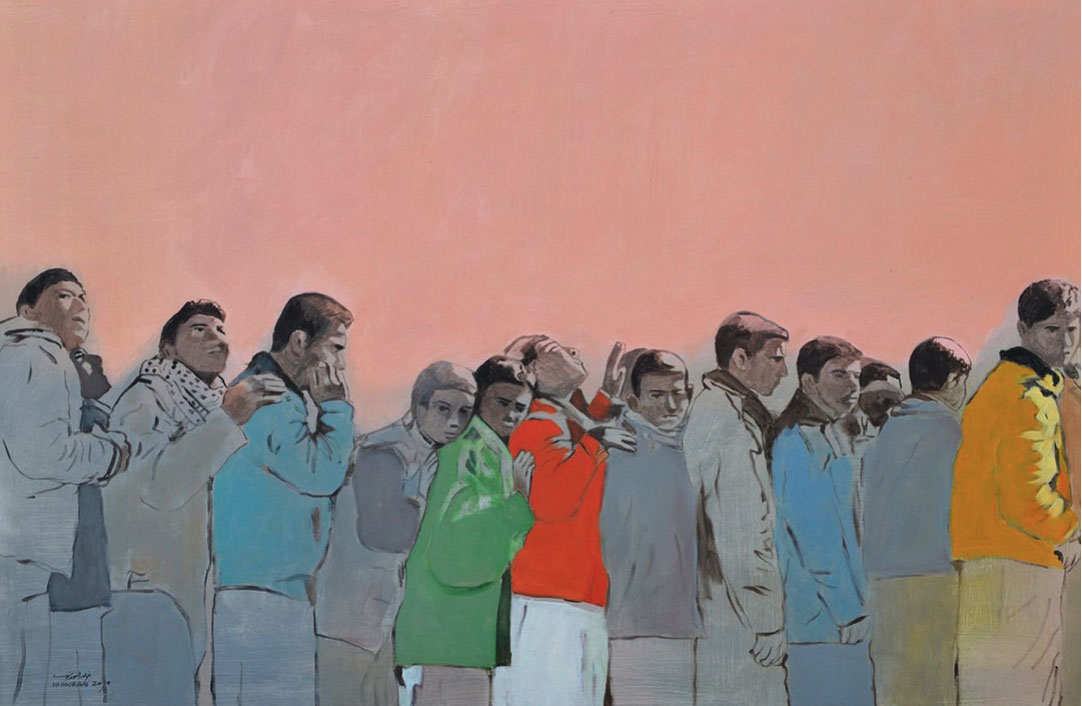
•
Agony
Today I went to Sawarha to see my wife Abeer and bring her some food and hygiene items, which became very difficult to secure in Sawarha. I left home at 8:30 a.m.
In Rafah, the crowds are unbelievable. Moving, walking one hundred meters takes at least ten minutes. A city of 200,000 inhabitants with very weak infrastructure, received one million people. (I will write later about Rafah at another time).
Looking for a taxi to Sawarha. The normal cost of one is $1.5. The first taxi asked for $150. I left him for another one, arguing the price, finally there was no one cheaper than $65 with the condition that he would take other passengers on the way. I have no choice. We start moving. Thirty minutes to get out of the city toward Khan Younis but not really reaching Khan Younis as there is the Israeli invasion there. Before reaching Khan Younis City, the driver rook roads that I never knew about, until we reached the coast road.
Tents everywhere, people everywhere, street sellers of food items received from humanitarian aid are everywhere, making the road busy and crowded. The car on many occasions moved at the speed of a man walking. We reached Deir Al Balah, then Zawaida, then Sawarha. A distance of less than three km took more than 1 hour and 20 minutes. A long line of cars, trucks, donkey carts, all types of vehicles are full of people, mattresses, stuff, cooking gas cylinders, jerrycans for water, bread flour, vehicles full to bursting, stuff tied with ropes, all are moving to the south, evacuated from Nuseirat.
The image is like Judgment Day. People look very tired, very desperate, very unclean. Men are unshaven, young children crying everywhere, very afraid. You could feel the fear. You could touch the fear. They are going to Rafah, not knowing what they are going to do there. Everybody knows that Rafah is completely full; not only the houses, buildings or the public institutions but the streets, the parks, the side roads are completely full with tents and people. They are escaping from the bombing and the military invasion. They are running for their lives but have no idea where and what could happen to them.
Some volunteers were trying to help facilitate the traffic but it was an almost impossible mission. Some cars stopped due to engine problems; no side roads to push them into out of the line of traffic. The road also passes by shelter-schools on the sea road, which makes it more difficult; hundreds of street sellers in front of the schools, thousands of people move in and out, blocking the road. I am worried about being late. I must be back at 1 p.m. otherwise my mother will worry.
From Rafah to Sawarha normally takes 20 minutes even with a normal traffic jam. Arrived at 11.30. Sawarha was quiet. It is 2.5 km from the center of Nuseirat, but the invasion continues. The Israeli army started the invasion in a small part of Nuseirat two weeks ago. Now they’ve almost invaded the whole camp, leaving behind them huge destruction and hundreds of people killed. Bombing, shelling, heavy shooting.
I agreed with the taxi driver to take me to Sawarha and bring me back to Rafah, so I met Abeer for less than ten minutes. Checked on her and the family. Everyone is still alive but no one is ok.
Buddy, my dog, was so happy to see me. I was so happy to see him too. He kept jumping on me and running around. I don’t want to leave. I want to stay with my wife and my dog. I want to go back home. I want to settle down, to lay down on my bed or sit on my balcony with my wife, my daughter and my dog as we used to every evening, having some coffee. I need some rest and tranquility. Nothing more.
I discussed with Abeer the plan of their arrival to Rafah. Her parents completely refuse to leave until they see all the people in the area leaving. Abeer is unable to leave them alone. I don’t know what to do. What a complex situation. Trying to convince them is not helping. I understand that they are tired of moving and being displaced. They are too old for more agony. It is their only way to show that they are giving up. Time is running out. It will take me at least another two hours back to Rafah, to my mother. I deposited the stuff at the front door and left with the agreement of Abeer to communicate further on the mobile.
The journey back to Rafah was the same, the same crowd, the same sad people, the same traffic of displaced people in cars and vehicles full of their basic needs, full of hundreds of street sellers of food aid items, full of agony.
Back to Sawarha Again
On Thursday I went to Sawarha with some supplies for my wife and her family — some food and hygiene items.
On Friday Abeer called, very anxious and panicked. The bombing, shelling and air strikes did not stop in Nuseirat near Sawarha. People started to evacuate from there. There was random bombing near the house; they did not sleep. The news is that the sea road is safe from north to south but no one is allowed to move from south to north or the middle area.
They can’t leave alone. Our car is there but with no fuel. I spent all day looking for six liters of benzene, just enough to drive from Sawarha to Rafah in the south. Knowing the risk I am going to take by going north, I did not think for a single minute not to go. They can’t manage, they are ten — three children, four women, an old man and a young man, paralyzed with fear— I know that he won’t be able to help. Could not secure the fuel until 9 p.m., never mind the price, (normal price is $2 per liter, I paid $34/liter for six liters).
A friend of Abu Khaled, his business partner, a man I had never met before these days, offered to take me in his mini-jeep to help bring the family and whatever belongings we can bring such as mattresses, blankets, food, cooking gas and a gas cylinder and the gas itself, some kitchen items. If we don’t bring these things we will not find any at all in Rafah.
I can never thank him enough. He knew the risk. He could lose his car in a bombing, yet he did not hesitate. He even said that it was full of diesel so I shouldn’t worry about it.
Driving very early Saturday morning at 6 a.m., the main road between Rafah and Khan Younis is completely empty. Avoiding Khan Younis city as there is the military invasion there, we turn west two km before Khan Younis towards the sea road.
Since I was here the day before yesterday, new homes and buildings were destroyed. Parts of the roads were almost blocked by fallen rubble. But we managed.
Along the sea road, some movement — all kinds of cars, vehicles, trucks, jeeps, full of belongings and people all going south. Some people are in the streets. Driving and expecting the worst, but no choice. We continue. By Deir Al Balah, the city in the middle area, huge crowds of people are blocking the road, moving everywhere, looking for something called safety and shelter. Many can’t find it.
Normally it is only 22 km from Rafah to Sawarha and takes 30 minutes to drive but today is different. I arrived at 8.25 a.m. They were asleep after a long night of bombing, shelling and heavy shooting that shook the house all night. They fell asleep out of tiredness and fear. The good thing was they had prepared everything. All the stuff they need to take was packed and ready to be loaded on the cars. I put the benzene in our car, packed the stuff, distributed the people in the two cars and started the trip to Rafah. Rafah, where there is no place at all any more.
Rafah, the last city in the south of Gaza with borders with Egypt, inhabited by 200,000 with poor infrastructure, similar to all Gaza Strip cities and camps. Now hosting one million two hundred thousand people. Don’t ask how. For sure not in the houses — they are completely full. Wherever you look, in every empty space, at every roadside: tents, all kinds of tents, tents (good ones) received from humanitarian aid organizations, tents made from plastic and nylon sheets, tents made from pieces of fabric. More than one million people in tents — without toilets. People, mainly women, knock on doors asking to use the toilet; men are in lines at the mosques waiting to use the toilets. Without any facilities, in front of some tents, people make small fires to heat or cook. Hundreds of families on the streets did not receive a tent. They don’t have money to buy wood and plastic sheets to make their own — these cheap materials became more expensive than gold for poor people.
Here in Rafah I must bring my wife and her family. I think I was an angel in another life — I don’t know. I don’t really believe that. But I was planning a meeting with my staff who are providing psycho-social support in shelter-schools for children. I was planning to meet them on Saturday to hear from them and to provide them with some support, to check if there is anything I can do to facilitate their work. So I called one of them to ask him to postpone the meeting for another day. I’m busy bringing my wife.
This wonderful colleague from Rafah started to call people, looking for a place for them to stay. I was driving back, near Deir Al Balah, when he called me to say that he’d found a store, 6 meter by 2.5 meter-square, including a toilet. It is in the center of Rafah, in the middle of the main market. What luck! It is a 15-minute walk from where I am staying at Abu Khaled’s home, adjacent to Al Awda Hospital in Rafah. We arrived around 2 p.m. In front of the store, a bombed house, rubble in the street. The owner had brought some workers to clean up. The door of the store was damaged. He brought a blacksmith to fix it. The family waited in the cars for an hour until the place was almost ready. Some works still need to be done inside, never mind, Abeer’s brother will do it. They were exhausted. I brought them some food and left. I could not stay any longer. I should go and check on my mother.
Two hours later, I passed by to see how they are. For sure no one is happy. They are all so tired. Even our dog Buddy was quiet, sitting in the corner, and did not come to me when I arrived as he would usually. The place is hell. Not good, not comfortable, no light, some candles, yet a million times better than a tent on the street. No complaints.
I left them around 5 p.m. It gets dark. I could not stay. I must be beside my mother now.
Next day… another story …



